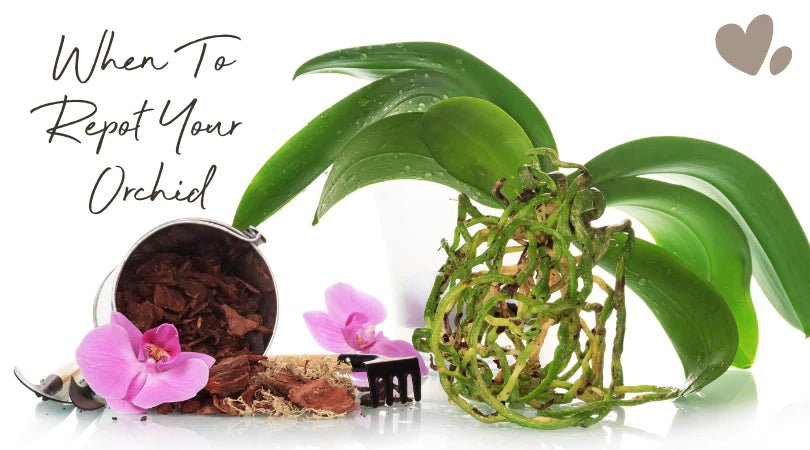When Should You Repot An Orchid?

Orchids aren't like other houseplants! Instead of thin tightly wound roots within a soiled pot, orchids grow in a container of loose materials such as bark and charcoal topped with moss. Repotting orchids can be tricky because they're so prone to diseases and you'll be exposing their roots, but if you take great care, you can get great results from repotting orchids.
If you want your orchid to continue to thrive and produce stunning flowers year on year, understanding when your orchid needs repotting is essential!

Signs It's Time To Repot Your Orchid:
Experts usually recommend orchid repotting every year or two, but that doesn't mean you need to wait until then to give them some TLC if they look like they need it! There are several other reasons why you might need to repot earlier or more often than expected. Here are some common reasons.
1. Your Orchid Has Outgrown Its Pot
If you notice that your orchid's roots look overcrowded in its current pot, it's time to repot your orchid. If you start to see roots growing up and out of the side of the pot or up the stem, this is a sure sign that your orchid has outgrown its current pot.
Slightly lifting roots growing upwards is perfectly normal and healthy. These are known as aerial roots, and are how the orchid would have attached itself to tree branches in its natural tropical environment. If these aerial roots are firm and white in colour, they are absolutely healthy and you shouldn't need to do anything at all. Just accept that this is normal behaviour for your plant. According to many orchid experts, removing or cutting healthy air roots can make your orchid susceptible to viruses and diseases.

However if you start to notice these roots are encroaching far more than before, or if you spot any withering or dead roots, your orchid definitely needs some extra attention and room to breathe!
2. Your Orchid's Roots Are Tangling Together
New Phalaenopsis orchid owners often confuse the plants natural, intertwined root pattern as a sign that their orchid is "pot-bound" and in need of repotting. However, as long as the orchid roots are loosely twisting and overlapping you can wait to repot as this is perfectly normal for moth orchids.

But if your orchid has tightly tangled roots, then it probably needs repotting. Depending on how long your orchid has been left in a too-small container will dictate how root bound it has become and how difficult it will be to repot. A root bound orchid will have grown out all the available space in the pot and will be growing upwards and sometimes down and out through the drainage holes. Carefully repotting your orchid, snipping any dead roots with sharp scissors and leaving all the healthy roots be will allow your orchid's roots to sufficiently absorb the nutrients it needs to flourish and bloom. (Check out this helpful video on orchid root health! )
3. When The Orchid Potting Mix Starts To Goes Bad
Your orchid gets nutrients from its potting medium, but eventually, enough nutrients will be leached from the media and it will begin to break down into compost (this process causes the area around the orchid to emit a sour odor so you're sure to notice! )
Repotting every year or so should help prevent this problem, but your mix may start decaying sooner than expected if it isn't draining properly or being allowed to fully dry out between watering.
So as a rule of thumb, If you start to smell something bad around your potting material, it's definitely a good idea to repot. ( You can purchase fresh orchid potting mix here!)

4. Your Potting Mix is No Longer Water Retentive
If when watering your orchid you start to notice that the compost is not retaining a lot, if any, water and instead is filtering straight through the drainage holes, this is a good indication that your potting mix is starting to go bad.
Potting mix that almost feels damp but isn't actually holding onto any water is a surefire sign that there is an issue with your medium. The mix is starting to decay and like with any of these indications, if left like this for a prolonged period of time this can cause disease, root rot and bacterial infections that can leave your orchid plant beyond saving
Repotting may help an orchid plant recover from these illnesses if it appears sick or unhealthy as shown above. It is always best to try and allow you potting medium to thoroughly dry out before repotting. If your orchid has developed a type of fungus, use clean scissors or knife to remove the affected area, treat the plant with a fungicide, then repot your orchid in a new clean pot.

5. If Your Orchid Plant Appears Sick
If you plant has any of the below it might be a very poorly orchid:
- Yellowing leaves: It is completely normal for the bottom most leaf to yellow and fall off, as this allows for more room for newer leaves to grow. However, yellowing throughout the top leaves could be a sign that your orchid is receiving to much light, is too cold or is developing root rot from being over watered.
- Very dark green leaves: This is usually a sign that your orchid isn't receiving enough light - this may also effect the potting mix's ability to dry out and can lead to infection. Move the orchid into somewhere with more indirect slight and monitor closely.
- Limp, wrinkled, or torn leaves: This is a sign of dehydration. you need to increase your watering and inspect your orchid’s root system for signs of stress and dying roots.
- Black spotted leaves: a fungal disease that forms when there is standing water on the orchid. The fungal spores will then swim through water and, once ready, will sprout mycelium and begin fruiting. This can be deadly to your plant.
Knowing when to repot your orchid helps you keep it healthy and flourishing for a long period of time (it will also ensure your orchid has the chance to rebloom in years to come!).




